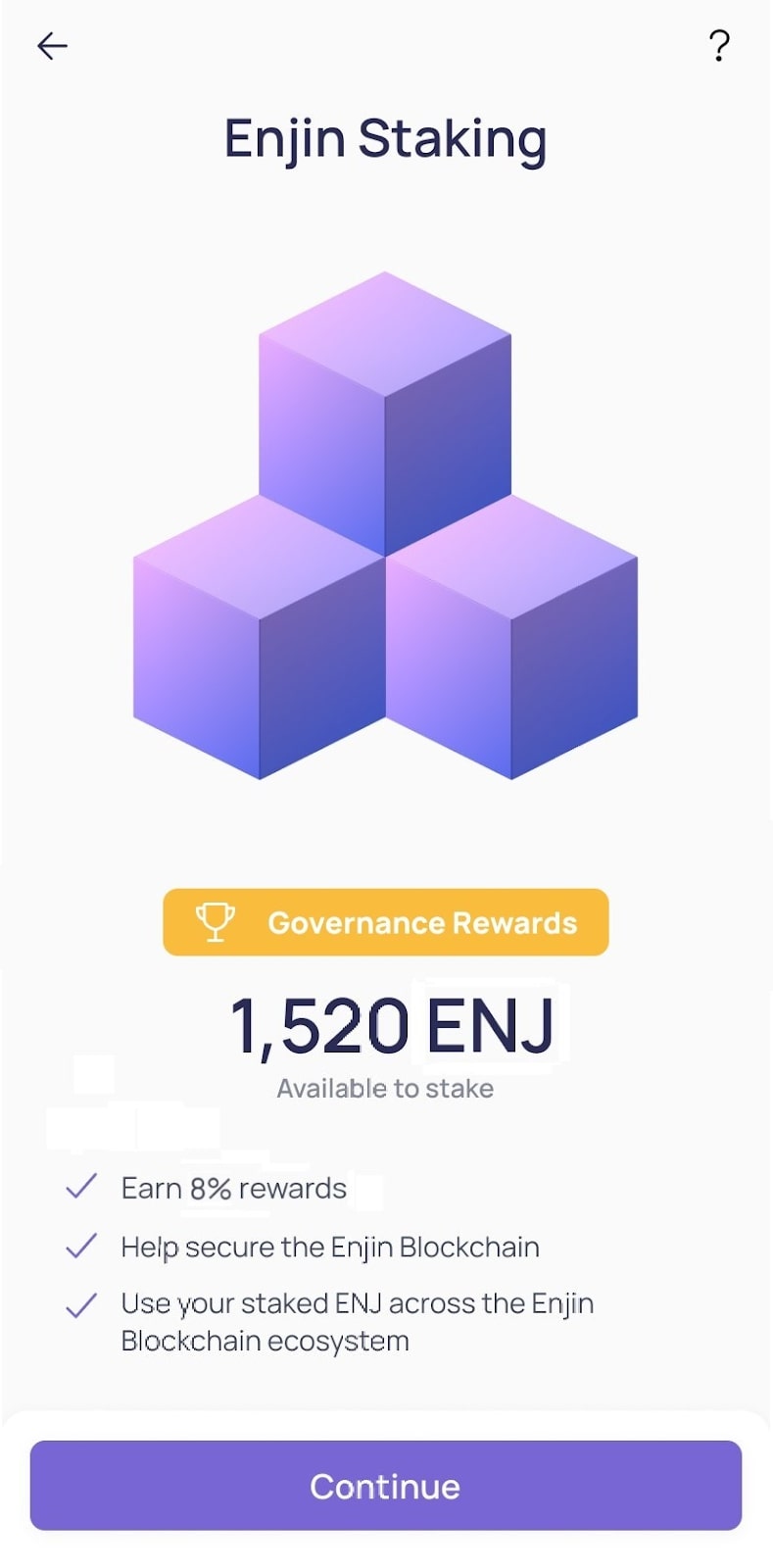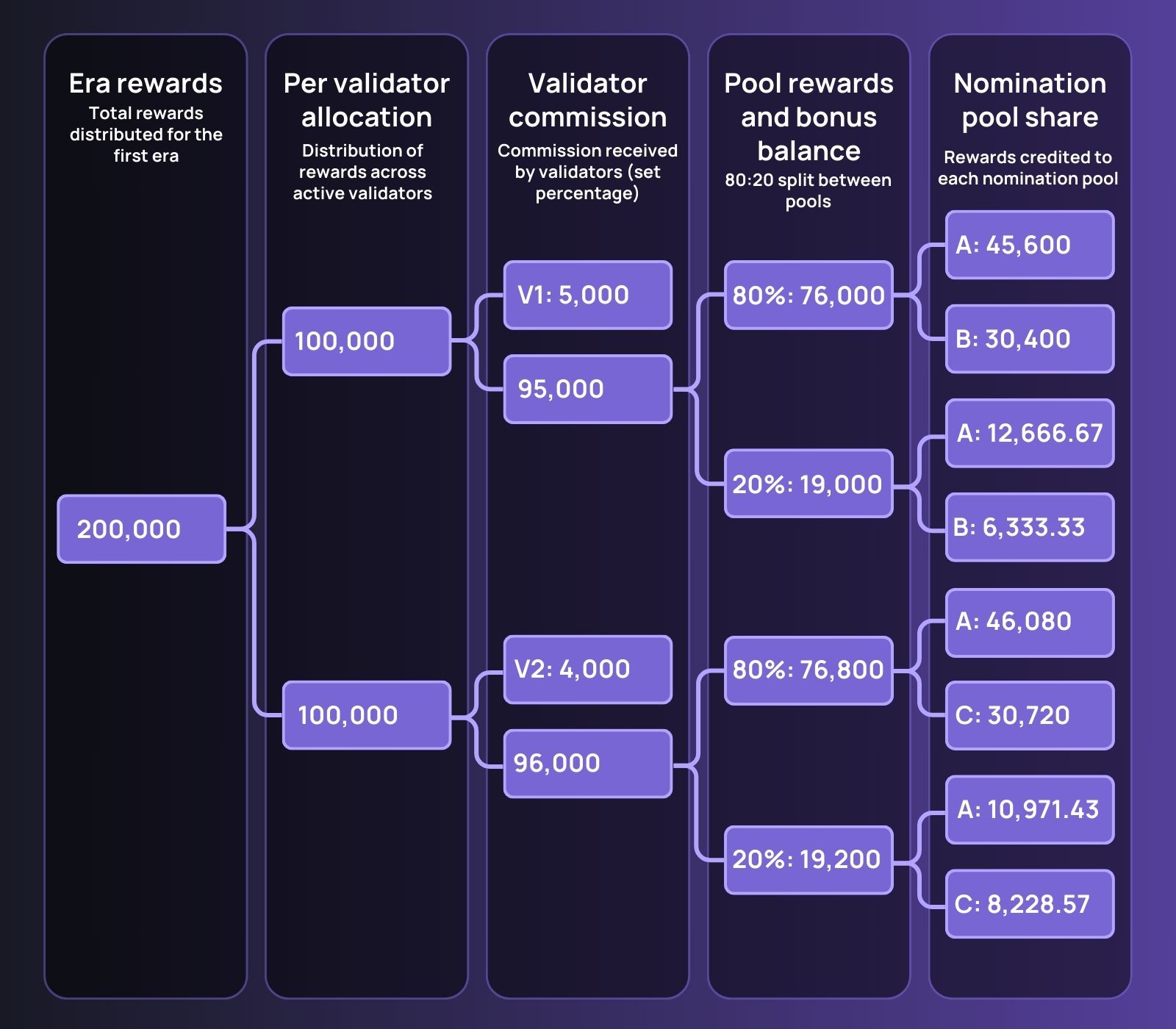

Enjin Blockchain is being secured and holders are being incentivized to participate in governance and validator oversight, after its token migration launched last September 13. A 250 million Enjin Coin (ENJ) early governance rewards pool was created to facilitate this. These rewards are to be released in 10 equal intervals beginning January 15, 2024.
Enjin Blockchain is a Substrate proof of stake blockchain custom built for non-fungible token (NFT) transactions. Being a proof of stake chain, it is secured through holders staking its native coin, ENJ.
A sufficient number of ENJ must be staked to ensure security and prevent any single holder from controlling the chain. More broadly, a sufficient number of ENJ holders must participate in chain governance and validator oversight to ensure its independence and decentralization. Holders participate by staking ENJ, subject to certain incentives and penalties.
Early Governance Rewards Release. Given the importance of securing a new proof of stake chain, Enjin Blockchain was created with a 250 million Enjin Coin (ENJ) early governance rewards pool to facilitate this by incentivizing migrating holders to stake ENJ and participate in governance and validator oversight. These rewards are to be released in 10 equal intervals beginning block height 3,247,000 (expected January 15, 2024 (Singapore time)). Each interval will be 30 eras in Enjin Blockchain or approximately 30 calendar days, and 25 million ENJ will be released at each release date.
An era in Enjin Blockchain is approximately 24 hours.

Greater Rewards to Earlier Pools. Early governance rewards will be released to holders who stake ENJ in nomination pools before before block height 3,247,000. These rewards will be distributed to nomination pools at this block height, with more rewards distributed to older pools following a linear formula. Thus, holders who staked ENJ in nomination pools that formed earlier (meaning, holders who staked longer) would receive a greater share of the rewards.
Nomination pools will then distribute these rewards to holders in proportion to their ENJ staked in the pool.
Participation in Early Governance Rewards. Holders may use external interfaces such as Enjin Wallet and Enjin Blockchain Console, an advanced interface, to stake ENJ in nomination pools. (Note ERC-20 ENJ must first be migrated from Ethereum to Enjin Blockchain as ERC-20 ENJ cannot be staked.)
Read:
How to migrate ERC20 ENJ / EFI tokens to Native ENJ
Migrating on Enjin Wallet (video)
How to participate in Enjin Blockchain governance and staking
Participating in Enjin Blockchain Governance and Staking on Enjin Wallet (video)
55% of ENJ allocated for swaps of ERC-20 tokens have been successfully claimed as of December 14, following the launch of Enjin Blockchain and its token migration last September 15. Holders of native ENJ are invited to help secure the chain and join governance.
Staking is the core of Enjin Blockchain security and governance, being a proof of stake chain. Validators and staking holders receive validator rewards and governance rewards to incentivize security and governance and 19 million ENJ of governance rewards have been released as of December 15, 2023.

.jpg)
Validators. Enjin Relaychain transactions are processed by validators. Transactions must be processed by multiple validators, ensuring security.
The chain sets a maximum number of nominated validators, and validators must be successfully nominated in order to process transactions and receive rewards. This nomination process and its incentives is the core of validator oversight.

Validator Rewards. Enjin Blockchain features token inflation to support network governance at a rate of 4.8927482% per annum, with new tokens released per era (or approximately daily). This ENJ is distributed in equal shares among active network validators.
Each such validator retains a chosen percentage (currently from 0.1-5.0%), then in turn distributes the remaining ENJ to the nomination pools that nominated that validator. These rewards are received to offset the costs of maintaining the validator, such as server costs.
Enjin Blockchain currently consists of Enjin Relaychain and Enjin Matrixchain, with transactions processed in Enjin Relaychain. (Please see the Enjin Blockchain whitepaper.)
Nomination Pools. Validators may only be nominated through nomination pools, not directly by holders. Nomination pools may only be formed by holders of the special Degen NFT collection, whose release details will be announced at a later date.
A nomination pool nominates validators as a pool, as chosen by the pool creator, and:
The validators nominated by pools with the highest aggregate ENJ staked to support their nomination will be chosen to process transactions.
Governance Rewards. A nomination pool creator receives a percentage (typically 5%) of the rewards received from validators, then distributes the rest to holders that staked ENJ in the pool in proportion to their ENJ staked. These rewards are received for providing validator oversight.
Validators distribute governance rewards to nomination pools, after deducting the validator’s share, in two ways:
These distributions are outlined in the example below.
Governance rewards are distributed at the end of each Enjin Blockchain era.

Governance Rewards Example
The rewards distributed per era depends on how much ENJ is minted due to token inflation in that era.
In this simplified example, assume there are:
• Only 100,000 ENJ staked for governance
• Only 2 validators:
• Only 3 nomination pools:
Assume the 3 nomination pools nominate validators as follows:


Assume 200,000 ENJ is released as governance rewards In the first era. These would be distributed to validators and nomination pools as follows:
1. Validator Rewards. Because there are two validators, each receives half of the governance rewards (100,000 ENJ each).
2. Validator Commission. Validator 1 receives a commission of 5,000 ENJ (because it set a rate of 5%). Validator 2 receives 4,000 ENJ (rate of 4%).
3. Nomination Pool Share. The remaining governance rewards (95% for Validator 1 and 96% for Validator 2) are split 80:20 among their nomination pools’ Pool Reward Balance and Bonus Balance.
Validator 1
Pool Reward Balance. Of the 95,000 ENJ in remaining governance rewards post-commission, 76,000 ENJ (80%) of this goes to the Pool Reward Balance of each nomination pool that nominated Validator 1, or Ali and Bart’s. The pools share the 76,000 ENJ in proportion to their ENJ staked towards Validator 1:
Bonus Balance. The remaining 19,000 ENJ will be credited to each pool’s Bonus Balance, in proportion to each pool’s duration.
Validator 2
Pool Reward Balance. Of the 96,000 ENJ in remaining governance rewards post-commission, 76,800 ENJ (80%) of this goes to the Pool Reward Balance of each nomination pool that nominated Validator 2, or Ali and Chao’s. The pools share the 76,800 ENJ in proportion to their ENJ staked towards Validator 2:
Bonus Balance. The remaining 19,200 ENJ will be credited to each pool’s Bonus Balance, in proportion to each pool’s duration.
4. Bonus Balance Transfer. Every era, a small amount of ENJ (based on the remaining eras) is taken from each pool’s Bonus Balance and transferred to and restaked in the Pool Reward Balance. The amount transferred increases as a pool’s duration decreases, based on this formula:

ALI
BART
5. Pool Reward Balance. At the end of the first era, each Pool Reward Balance holds (i) its 80% share of the pool’s rewards for that era, and (ii) the amount transferred from the Bonus Balance for that era. Therefore, each nomination pool in this example would have a Pool Reward Balance of:
6. Degen Commission. Each Degen holder backing a nomination pool receives a commission at the end of each era, depending on the commission rate set. For the first era:
7. Pool Reward Balance Restaked. After deducting the Degen commission, the remainder of each Pool Reward Balance is then restaked toward the pool’s nominated validators.
Existential Deposit. A wallet must maintain at least 1 ENJ to receive governance rewards.
Enjin Blockchain is a blockchain custom built for NFT transactions at the protocol level, and is supported by an app layer for no-code NFT integration into indie games and other platforms. Features and apps include:
ENJ was the first NFT/metaverse token, launched in 2017 and became the foundation for the world’s first NFT gaming ecosystem and one of the world’s largest token ecosystems. This became a decentralized, self-selected community of NFT and NFT gaming enthusiasts, with over 170,000 unique addresses (excluding accounts in centralized platforms) pre-migration. This community in turn drew from the users of Enjin, a gaming community software company founded by Maxim Blagov and Witek Radomski in 2009 whose Enjin CMS (content management system) had 21 million users at its peak. Witek later authored ERC-1155, one of the most widely used Ethereum NFT standards.
.jpg)
Enjin Blockchain’s launch involved a successful “triple migration” of both tokens and NFTs across three chains, Ethereum, Polkadot and Enjin Blockchain. Over 200 million NFTs were migrated from Ethereum to Enjin Blockchain.
Oscar Franklin Tan (press@enjin.io) is the Chief Financial Officer and Chief Legal Officer and Isabel Guidote-Pangalangan is the General Counsel of Atlas Development Services, a core contributor to Enjin Blockchain.